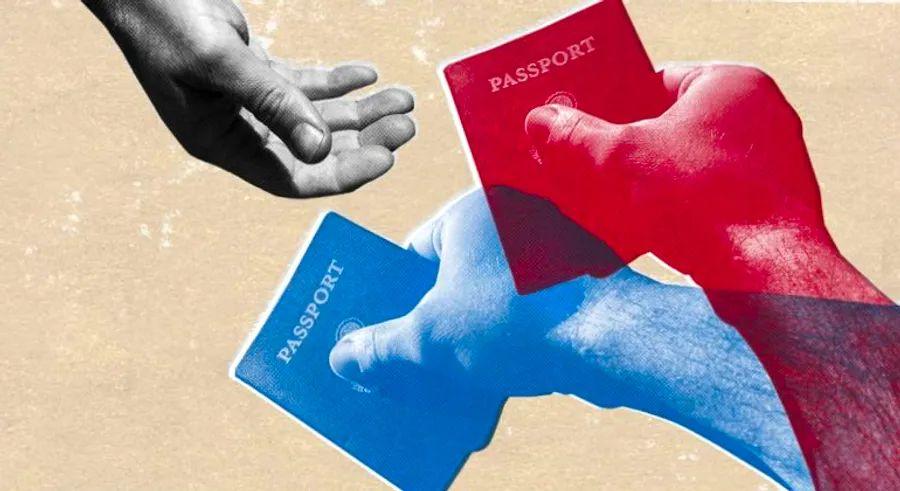These Asian Countries Are Forcing Dual Citizens to Choose: Nationality and Loyalty in the Balance

Anna was born with dual citizenship, inheriting Japanese nationality from her mother and American citizenship from her father. She grew up moving between the two countries, forming a deep bond with both cultures.
However, Japan mandates that individuals with dual nationality must choose one passport by the age of 22 – a difficult decision for Anna, who has asked for privacy and a pseudonym.
“I’m mixed race, I’ve lived in both Japan and the US, I speak both languages, and my identity feels completely divided,” she explained. “It’s like asking someone to choose between loving their mother or father more. It’s an incredibly painful question.”
Over the past few decades, international migration has surged. According to the International Organization for Migration, the number of people living abroad for at least a year tripled between 1970 and 2015.
Meanwhile, tolerance for dual citizenship has generally grown. In 1960, fewer than one-third of countries allowed citizens to hold a second nationality. Today, three-quarters do, according to a 2019 study by Maarten Vink, professor of political sociology at Maastricht University in the Netherlands.
Asia stands as an outlier in this trend. It remains the most restrictive region in terms of dual citizenship, with only 65% of countries and territories allowing it, according to the Maastricht Center for Citizenship, Migration and Development. By contrast, 91% of countries in the Americas are more liberal on the issue.
Several Asian countries have recently taken a harder stance on dual citizenship. In January, Japan reaffirmed its strict policy when a court upheld the country’s ban on dual nationality, rejecting a lawsuit from Japanese citizens residing in Europe. In February, Hong Kong escalated its approach, denying dual citizens consular protection – a first for the city, where dual citizenship was unofficially tolerated despite being legally prohibited.
“Dual nationality is not recognized under the Chinese Nationality Law,” Hong Kong’s leader, Carrie Lam, declared in February. “This policy is being strictly enforced.”
There are several factors contributing to Asia’s resistance to dual citizenship, including the region's complex histories of conflict and colonialism. Critics, however, argue that in some countries, the prohibition reflects a growing nationalism and a desire to preserve a monoethnic, monocultural society.
Loyalty and Nationalism
In the Asia Pacific region, only a handful of countries accept dual citizenship without restrictions, including Cambodia, East Timor, Australia, New Zealand, and Fiji.
Most countries in the region oppose dual citizenship, though some turn a blind eye, allowing people to hold multiple passports by simply not declaring them. Others have more limited policies: the Philippines permits dual nationality for those born Filipino, but not for those who acquire citizenship later. South Korea allows children of Korean nationals born abroad to hold both the Korean passport and that of their birth country.
A key reason many Asian countries reject dual nationality is the concern over divided loyalties, according to Jelena Dzankic, co-director of the Global Citizenship Observatory (GLOBALCIT). “Historically, countries have opposed dual citizenship because it raises the question: who would you defend if both your countries went to war?” she explained.
Japan's current nationality laws were established shortly after World War II, a period when many Japanese Americans were placed in internment camps in the U.S., while other dual nationals renounced their allegiance to the Japanese Emperor for their safety, said Atsushi Kondo, a law professor at Meijo University in Japan.
In one well-known case, a Japanese-American dual citizen, born in the US, worked in Japan for a company responsible for American prisoners of war. After returning to the US post-war, he was convicted of treason and sentenced to death. He was later pardoned and deported to Japan. For years afterward, Japanese lawmakers used this case as an example of the complexities and conflicts inherent in holding dual nationality.

As Atsushi Kondo pointed out, 'During wartime, dual citizenship was viewed as a liability. However, in times of peace, it offers numerous benefits,' including visa-free travel to more countries, expanded global job prospects, potentially lower university tuition fees, and more. On the downside, US dual nationals face double taxation, though most countries don't impose such a burden.
The global situation has evolved, and Japan's stance on dual citizenship may now seem outdated, Kondo said. However, the government remains hesitant to revise its immigration policies, fearing backlash from conservative voters.
China's ban on dual nationality is designed to ensure that its citizens offer 'undivided loyalty to the government,' according to Low Choo Chin, a history lecturer at the Universiti Sains Malaysia. During the Cold War, China's attempt to rebuild ties with neighboring countries and end its international isolation was hindered, as 'overseas Chinese were linked to revolutionary movements and Communist uprisings,' Low wrote in a 2016 paper. In response, the Communist government established its current nationality laws in 1980 to settle 'diplomatic tensions' and end divided allegiances among the Chinese diaspora.
Under President Xi Jinping, the Chinese government has intensified its crackdown on dual citizenship, encouraging citizens to report those who secretly hold two passports. Those caught can find their access to public services severely restricted.
The issue of citizenship became particularly urgent during the Covid-19 pandemic. In a crisis that crossed national borders, governments were suddenly forced to answer difficult questions: Which citizens do we recognize as our own? Whose welfare are we responsible for? Who are we obligated to protect?
Because China refuses to acknowledge dual citizenship, many Chinese nationals were prevented from returning to their country of secondary citizenship – even if that country was their birthplace or primary residence.
There were instances where families were torn apart; for example, a British woman was told she could not evacuate with her 3-year-old son because he held a Chinese passport, even though he was also a British citizen with a British passport. Under international pressure, the government ultimately backed down.
Ethnicity and blood
The concept of loyalty to one country and culture, especially in East Asia, is often linked to the desire to preserve a unified ethnocultural identity, according to Dzankic from GLOBALCIT. Many of the nations that reject dual citizenship are also notably homogenous – for example, Han Chinese make up 92% of China's population, according to the CIA's World Factbook.
One of the most straightforward ways for a nation to control its ethnic composition is by determining the citizenship criteria it recognizes.
Citizenship can be acquired in a variety of ways, including through marriage, adoption, or naturalization. However, the most common methods are birthright citizenship (jus soli), which grants citizenship to babies born on the country's soil, and descent-based citizenship (jus sanguinis), where children automatically inherit the citizenship of their parents.
In Asia, the majority of countries do not recognize birthright citizenship, which is one of the fastest routes for foreign or minority populations to increase within a nation.
In some cases, birthright citizenship is granted but with specific restrictions, as noted by GLOBALCIT. For example, South Korea only applies birthright citizenship to children who are abandoned or whose parents are stateless – meaning that a child born in South Korea to parents without nationality or in cases of abandonment would receive Korean citizenship.
Olivier Vonk of the Maastricht Centre observed in a 2017 paper that Asia saw a significant shift from jus soli (birthright citizenship) to jus sanguinis (citizenship by descent) during the 20th century. Countries like Bangladesh, Indonesia, and India are examples of this transition to primarily recognizing citizenship based on ancestry.
The type of citizenship a country recognizes, along with the strictness of its policies, directly impacts the diversity or homogeneity of its population, according to Kondo.
In the past, South Korea was a monoethnic society, Kondo noted. However, the country’s policies have evolved to embrace greater diversity. Today, South Korea is recognized as a multi-ethnic, multicultural nation.
South Korea reformed its nationality laws in 2010, allowing permanent dual citizenship for the first time under specific conditions. Those who did not meet the criteria were given more time to decide, and a special naturalization process was introduced to attract talented individuals.
Japan maintains strict nationality laws and is considered ethnically homogeneous, according to Kondo. However, the government's official statistics do not provide an ethnic breakdown of the population.
Kondo explained that many ordinary Japanese people view ethnicity and citizenship as inseparable. This traditional perspective is deeply ingrained in the general population, with some politicians even advocating for Japan to remain a monoethnic nation.
Anna, who now lives in the UK, pointed out that the concept of jus sanguinis, or citizenship by descent, carries a strong association with ethnicity. The Latin term translates to 'right of blood,' and this idea is central to Japanese citizenship, making the concept of 'blood' deeply embedded in their understanding of nationality.
Even if a naturalized Japanese citizen who is not ethnically Japanese has a child, that child will automatically acquire Japanese citizenship. However, societal attitudes and norms often still draw clear ethnic boundaries, with mixed-race or biracial Japanese facing bullying and social exclusion, particularly in schools.
Anna, reflecting on her own experience, explained that despite holding Japanese citizenship, she is often not accepted as fully Japanese because of her mixed heritage. She said, 'It's this idea of blood purity... I’m not considered 'pure' Japanese because I don’t look like them. A lot of it is xenophobia and racism.'
Looking ahead,
Recent developments in China, Japan, and Hong Kong indicate a trend in Asia away from embracing dual citizenship, even as other parts of the world become more accepting. For example, Malawi, which once prohibited dual nationality, reversed its stance in 2019. Similarly, Russia and Norway followed suit in 2020 by allowing dual citizenship.
In Hong Kong, the future of dual citizenship remains uncertain. Although the government has signaled a stricter approach to enforcement, it has not yet disclosed specific measures or explained how the city's large population of dual citizens will be impacted.
Janice Tam, a Hong Kong resident with dual British citizenship, remarked, 'About 70% of my friends also hold another passport.' She expressed little concern over the government's recent statements but noted, 'It depends on whether they force you to choose one passport. What happens if you pick your foreign passport? What benefits do you still have in Hong Kong?'
Ella Wong, a dual Canadian and Hong Kong citizen, remains 'optimistic' that daily life for dual citizens will remain unchanged. Her only worry is that Hong Kong might align its immigration laws more closely with mainland China, or potentially adopt those laws entirely.
‘With the Hong Kong passport, its future is uncertain,’ she remarked. ‘Could it eventually become a Chinese passport? If that happens, what will it mean for things like travel, employment, and residency?’

Across most of Asia, it's unlikely that many countries will relax their nationality laws anytime soon, according to Low. While the West tends to champion liberalism and individual rights, including the right to dual citizenship, many Asian constitutions view access to citizenship as a privilege rather than a right. In this context, the idea of Asian governments permitting dual citizenship seems a distant possibility.
Despite the current resistance, experts and dual citizens remain optimistic that change will eventually come as global migration continues to rise. ‘It takes time,’ said Vink, a professor at Maastricht University.
Although still a minority, a handful of Asian nations have started introducing more flexible citizenship policies. For example, India established a new permanent residency category in 2005, allowing people of Indian heritage to live and work in the country.
While it doesn’t constitute dual citizenship, this move represented ‘a step toward recognizing the realities of a globalized world and gradually adapting to them,’ said Dzankic. ‘Even though countries are generally strict about dual citizenship, these intermediate statuses could potentially pave the way for more permissive policies in the future.’
‘I hope the world evolves,’ she continued. ‘What I believe is crucial is moving toward dual nationality not merely as a connection to the state, but also as a means of protecting individuals – offering them greater opportunities for a better future.’

1

2

3

4

5
Evaluation :
5/5